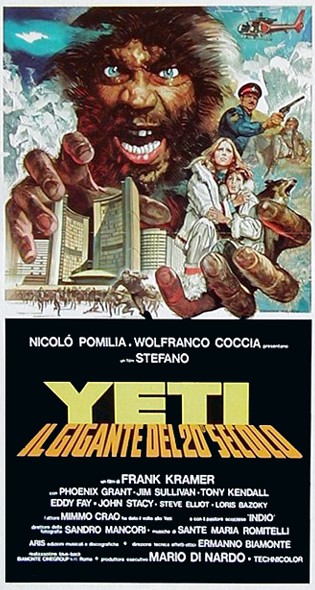 Even the most dedicated bad movie buff will be appalled by this abomination from 1977, but I can’t say it isn’t entertaining. If nothing else, YETI: GIANT OF THE 20th CENTURY represents an astounding demonstration of just how unbelievably shitty a movie can get.
Even the most dedicated bad movie buff will be appalled by this abomination from 1977, but I can’t say it isn’t entertaining. If nothing else, YETI: GIANT OF THE 20th CENTURY represents an astounding demonstration of just how unbelievably shitty a movie can get.
This Italian made, Toronto lensed outrage was directed by the prolific Italian trashmeister “Frank Kramer,” a.k.a. Gianfranco Parolini (whose previous films include the spaghetti western classics IF YOU MEET SARTANA PRAY FOR YOUR DEATH, SABATA and GOD’S GUN). It was a none-too-disguised rip-off of the 1976 KING KONG, and something of a companion-piece to the same year’s equally outrageous Hong Kong production GOLIATHON/THE MIGHTY PEKING MAN, which also cribbed mightily from KONG.
For some reason YETI has fallen into obscurity, although its status as a cult item hasn’t dimmed: a 2010 screening at a cult movie festival in Savannah, GA is said to have brought down the house.
In the frozen wastes of Alaska a massive yeti, or Bigfoot, is found encased in ice. An expensive excavation is mounted, financed by a sleazy businessman.
Upon being dug up the yeti is packed into a giant phone booth that’s air lifted via helicopter, allowing the creature to gradually thaw in the air. After being set down on land the yeti goes nuts, busting out of the phone booth and uprooting a tree. It only calms down upon seeing the young Herbie and his teenaged sister Jane, with whom the critter is immediately smitten.
The yeti carries Herbie, Jane and their dog to a secluded spot where the three bond, and dine on a giant fish. What the critter doesn’t realize is that Herbie and Jane are the children of the slimy businessman responsible for the whole mess.
Back in the world’s cities the populace catches yeti fever. Yeti posters and t-shirts become must-own items, and masses of people flock to Toronto, where the yeti is set to be publicly unveiled.
Said unveiling occurs atop a tall building, where the freaked-out yeti embarks on another rampage. Jane is nearly killed in the melee, but luckily the yeti catches her as she falls down an elevator shaft. More mayhem follows as the yeti makes its way through the city, ending up in the headquarters of Jane’s father’s company—where Jane is being manhandled and her dog (nearly) killed. As you might guess, this does nothing to improve the critter’s disposition, and results in a lot of excess destruction.
This is a BAD movie in every conceivable aspect. It contains promising elements that always seem to be ruined somehow, such as an early, rather eerie shot of the yeti submerged in ice whose effect is considerably lessened by the ludicrous disco score. Speaking of which, the film’s theme song, a disco-fied rendition of “Carmina Burana”—accomplished, the end credits claim, by “The Yetians”—must be heard to be believed.
The (none-too) special effects are about as you might expect. Little effort was expended on making the yeti look believable, as the critter appears throughout as exactly what it was: a guy (actor Mimmo Crao) in a hairy suit whose very human face is always visible. Low angle shots are employed to make Mr. Crao appear giant-sized, while unmoving statues are utilized in scenes where actors are required to interact with the creature’s giant legs and hands.
The dubbed dialogue is very much in keeping with the overall film (i.e. as the yeti uproots a tree someone shouts “He’s got a tree!”), and so is the acting—or, more accurately, “acting.” The film is, in short, an absolute jaw-dropper.
Vital Statistics
YETI, GIANT OF THE 20th CENTURY (YETI–IL GIGANTE DEL 20 SECOLO)
Stefano Film Productions
Director: “Frank Kramer” (Gianfranco Parolini)
Producers: Wolfranco Coccia, Mario di Nardo, Gianfranco Parolini, Nicolo Pomilia
Screenplay: Marcello Coscia, Gianfranco Parolini, Mario di Nardo
Cinematography: Sandro Mancori
Editing: Manilo Camastro
Cast: “Phoenix Grant” (Antonella Interlenghi), Mimmo Crao, Jim Sullivan, Tony Kedall, “Eddie Faye“ (Edoardo Faieta), John Stacy, “Steve Elliot“ (Stelio Candelli), “Loris Bazoky” (Loris Bazzocchi), Donald O’Brien, “Al Canti” (Aldo Canti)
